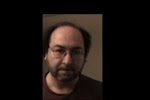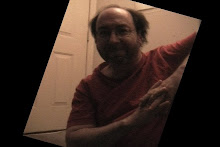And now on to other things!
Preface Regarding Secret Occurrences On TV Last Night
What I am about to describe regarding conclusions I’ve arrived at concerning last night’s television would never read as on target to someone unfamiliar with a specific inside shorthand that has evolved, and what’s worse, people out of that loop might easily be led to make wrong surmisals regarding just how I arrived at my conclusions, thereby believing my statements to be foolishly arrived at. I would be better off if the outsider felt himself in the dark as to how I arrived at my conclusions, which is truly where the outsider is. Being who I am, I will not allow the anticipated misperceptions of the outsider to interfere with nor dictate what I choose to communicate to certain people, though it may seem that I am inflicting pain upon myself in so acting. Maybe I should just limit myself to inside references cryptically expressed, as so many others do.... no, don't think so.
Secret Occurrences On TV Last Night
Every once in a while, rather than one TV show including enough things regarding my material as to allow me to draw clear conclusions about inside references to my works, instead several TV shows on the same evening include things regarding the same Steinhoff material, so that between the things contained on different shows on the same evening, there would cumulatively be enough things such that inside references would become obvious to me. Last night was such a night. I have in previous blogs referred to occasional references to my material on “24”, and also to occasional references to my material in works featuring Arquettes (reasons regarding why there should be frequent usages found in material involving Arquettes have also been detailed in previous blogs). And so last night, both “24” and Patricia Arquette’s “Medium” referred to the same moment in Steinhoff’s Dostoyevsky’s “Uncle’s Dream” (1992): the moment when Susan says, “Are you the hurting kind, you know, like in that Beatles song?”
 The legitimacy of this observation of an inside reference to my Dostoyevsky is reinforced by the subject matter found on both TV show episodes: On “24”, Jack Bauer is confronted, in the most poignant way thus far, on the question of whether he is too indifferent to the pain/suffering/death that result from his actions ("the hurting kind?"); on “Medium”, Allison Dubois (Patricia Arquette) asks herself whether she is guilty and should hold herself morally responsible for inflicting a wound ("the hurting kind?"). In both TV shows, conspicuous use is made of a commonly seen action, one character placing his hand on the shoulder of another. Yet these usages show up on my special "be alerted" radar, because the rhythm of the scene is slowed down for these actions, as if something of plot significance is occurring instead of a more common behavior. Thus, the shorthand was present, and sure enough, in looking further, I found reinforcement of this observation in the aforesaid focus on the “hurting kind” issue, combined with the repeating of these components in both shows on the same night. Due to copyright protection technology I cannot even copy these TV moments on camera to present here in a videoclip, even if I wanted to - but without explanation the moments scarcely speak for themselves anyway.
The legitimacy of this observation of an inside reference to my Dostoyevsky is reinforced by the subject matter found on both TV show episodes: On “24”, Jack Bauer is confronted, in the most poignant way thus far, on the question of whether he is too indifferent to the pain/suffering/death that result from his actions ("the hurting kind?"); on “Medium”, Allison Dubois (Patricia Arquette) asks herself whether she is guilty and should hold herself morally responsible for inflicting a wound ("the hurting kind?"). In both TV shows, conspicuous use is made of a commonly seen action, one character placing his hand on the shoulder of another. Yet these usages show up on my special "be alerted" radar, because the rhythm of the scene is slowed down for these actions, as if something of plot significance is occurring instead of a more common behavior. Thus, the shorthand was present, and sure enough, in looking further, I found reinforcement of this observation in the aforesaid focus on the “hurting kind” issue, combined with the repeating of these components in both shows on the same night. Due to copyright protection technology I cannot even copy these TV moments on camera to present here in a videoclip, even if I wanted to - but without explanation the moments scarcely speak for themselves anyway. Ending
Do I see in all of this an invitation to expound on the subject of what makes someone the “hurting kind”? This is too vast a subject, requiring discussion of all sorts of issues: references to preconditioned social perceptions and so forth; the imagination and experience to even see the potential for devising ways to avoid collateral damage; the passing of a serious responsibility with the intention that the responsibility nevertheless be addressed, rather than the intention to avoid being held culpable; the illusion that the negative energy in the world, which is related to inflicting hurt, can be reduced if squeezed into occupying a box 5” x 3” x 2” instead of a box 6: x 4” x 3”. I may see things connected to this issue that others would find tangental. I would likely stray far from a discussion of rotten bastards who go around hurting people. Here I touch on a few of the things I see as related to this question, but do not feel that the time has been granted me to truly explore this gigantic subject.


No comments:
Post a Comment